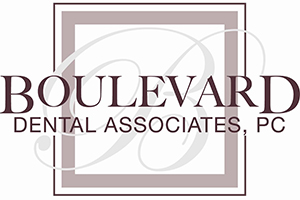
It is easy to sometimes feel alone in your dental symptoms and concerns. You may ask yourself questions such as: Is this what others experience? Is my dental issue common? Such questions can be anxiety-provoking. We at Boulevard Dental want to help address and alleviate these dental anxieties and questions by discussing what dental symptoms and concerns are shared and common among others.
According to the American Dental Association’s (ADA) online MouthHealthy article, “Top Ten Dental Symptoms,” the following are some of the most common dental symptoms people experience:
Toothache:
Toothaches can manifest as pain in the mouth or jaw. They usually result from cavities, but they can also indicate gum disease, abscesses, or impacted teeth. If you have a toothache, see your dentist right away to determine its cause and to prevent more severe problems.
Sensitive Teeth:
If you have sensitivity when you drink hot or cold drinks, you may have sensitive teeth. Sensitive teeth can result from tooth decay, fractured teeth, worn fillings, gum disease, worn tooth enamel, or an exposed tooth root due to gum recession. The treatment for sensitive teeth will depend on the cause of the sensitivity.
Bleeding or Sore Gums:
Bleeding or sore gums could result from gingivitis (an early and reversible stage of gum disease) or just the result of brushing too hard or beginning a new flossing routine. If your gums are puffy, regularly bleed, or you have a family history of gum disease, make an appointment with your dentist.
Mouth Sores:
Different types of mouth sores include canker sores, cold sores, leukoplakia, and candidiasis that may vary in their severity and causes. They could indicate a disease or disorder, infection from bacteria, viruses or fungus, or simply could be caused by irritation from braces, dentures, or the sharp edge of a broken tooth or filling. See your dentist if a mouth sore lasts a week or longer.
Bad Breath:
Bad breath can be caused by what you eat, not brushing twice a day or not flossing daily, dry mouth, smoking, or other medical conditions. Persistent bad breath could indicate gum disease, so see your dentist if symptoms of bad breath are prolonged.
Jaw Pain or Popping/Clicking in the Jaw:
Possible causes of jaw pain or popping/clicking are sinus problems, toothache, arthritis, injury, teeth grinding, gingivitis, or problems with your jaw like TMJ. See your dentist for an examination that may include X-rays in order to determine the source of the problem.
Dry Mouth:
Sufficient saliva in the mouth is important because saliva is your mouth’s main defense against tooth decay. It does this by washing away food, neutralizing acids produced by mouth bacteria, and releasing disease-fighting substances into the mouth. Dry mouth could be a symptom of a medical disorder or it could be a side effect of certain medications. Your dentist can recommend treatments to help restore moisture to your mouth.
Oral Piercing Infections:
Your mouth contains large amounts of bacteria; this is what predisposes people with oral piercings to get mouth infections. Signs of infection from oral piercings include swelling, pain, fever, chills, shaking, or red-streaks around the site of the piercing. If you have any of these symptoms, contact your dentist or doctor immediately.
Cracked or Broken Teeth:
Brittle teeth, teeth grinding, or injury can all cause cracked or broken teeth. This can be very painful, even if the crack is not visible to the naked eye. Visit your dentist if you have pain when chewing so that your dentist can evaluate you for possible tooth cracks.
Even if you do not have any of the above dental symptoms, the ADA MouthHealthy article, “12 Signs You Need to See a Dentist,” also recommends that you see your dentist for the following reasons:
Ongoing Medical Issues:
Visit your dentist if you have been diagnosed with conditions such as diabetes, cardiovascular disease, eating disorders, are HIV positive, or are undergoing medical treatments like radiation, chemotherapy, or hormone replacement therapy.
Tobacco Use:
Any kind of tobacco use can lead to difficulties from bad breath to oral cancer. Tobacco use has serious implications.
Trouble Eating:
It is not normal to have difficulty chewing or swallowing. See your dentist immediately if this occurs.
You’re Pregnant:
Pregnancy can make some dental problems worse, so it is important to not miss your regular check-ups during this time.
The above dental symptoms and concerns are common among many, but that does not mean that solutions for them should not be actively sought. The very best way to address these concerns are regular visits to your dentist for check-ups. Prevention is always the best treatment! That said, if any of the above symptoms or concerns arise at any time, visit your dentist for an evaluation.
References:
ADA MouthHealthy. 12 Signs You Need to See a Dentist. https://www.mouthhealthy.org/top-reasons-to-visit-dentist. Accessed November 7, 2023.
ADA MouthHealthy. Top 10 Dental Symptoms. https://www.mouthhealthy.org/top-dental-symptoms. Accessed November 7, 2023.
